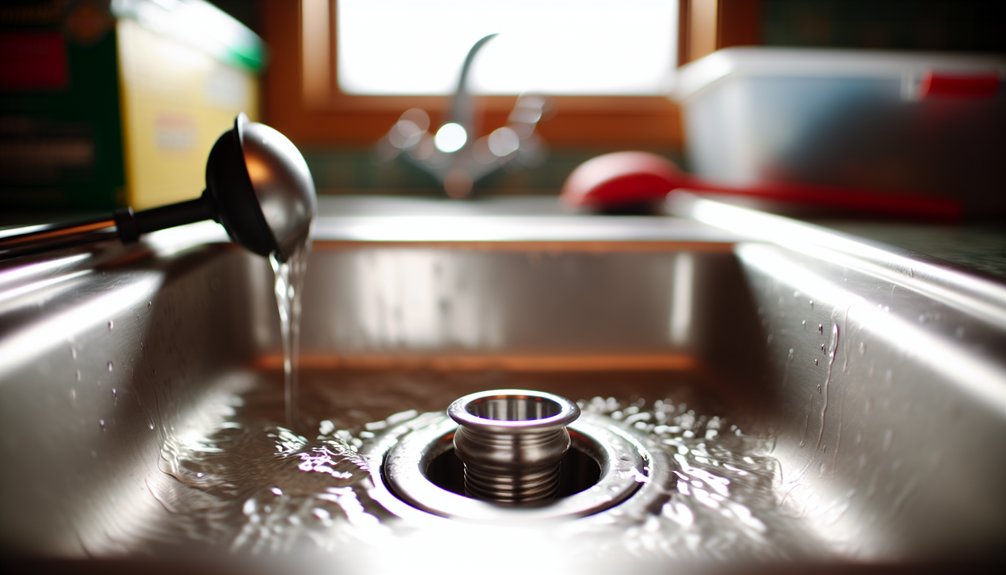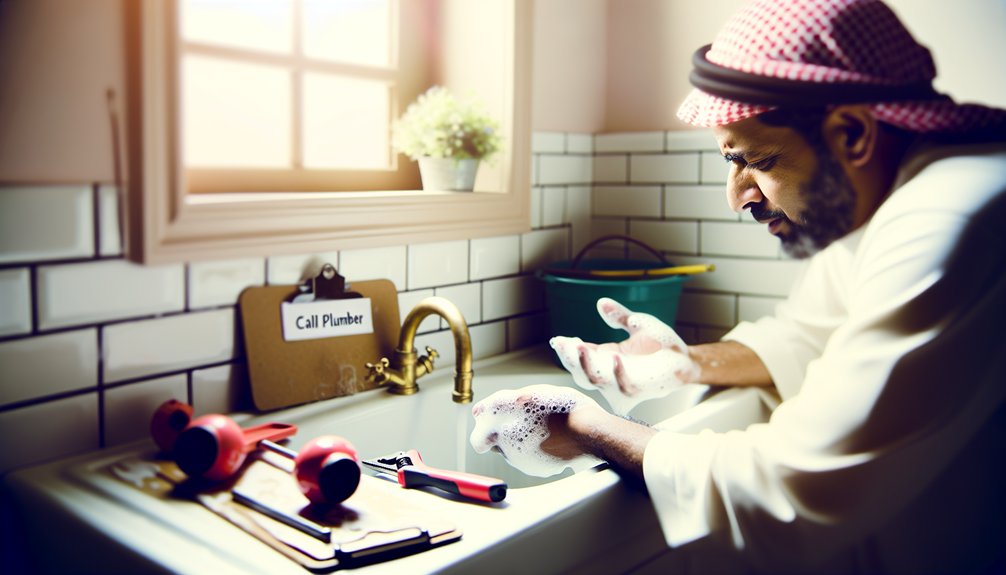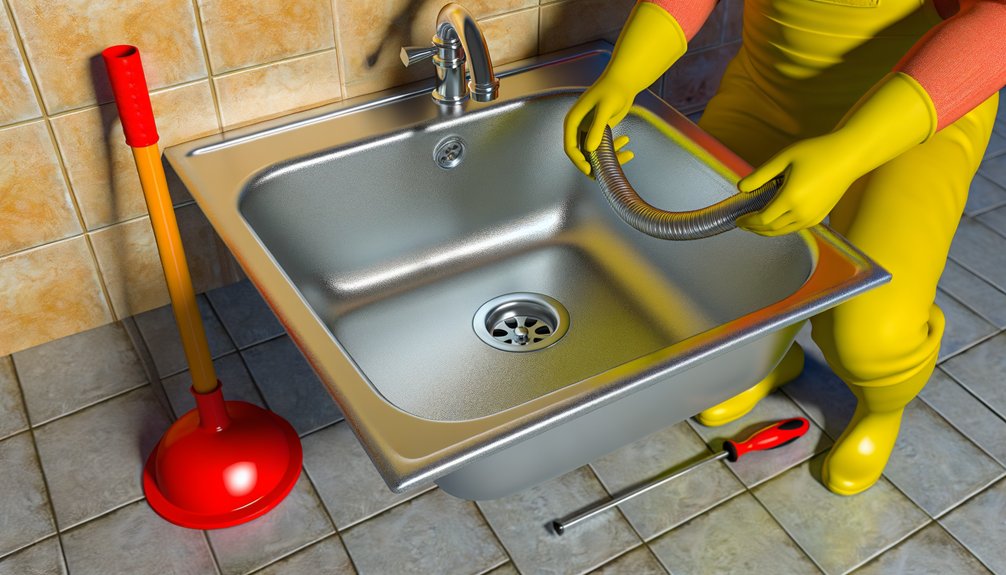To handle emergency clogged sink drains, first assess the severity by checking for slow drainage or standing water. If it's a minor clog, try DIY methods like plunging, using a baking soda and vinegar mixture, or flushing with hot water. However, if sewage backs up, odors persist, or multiple drains are slow, call a professional plumber. They possess specialized tools and expertise necessary for complex issues. Further strategies for prevention and effective troubleshooting are available.
Assessing the Severity of the Clog

How can one effectively assess the severity of a clog in sink drains? The first step is to observe drainage patterns. A clogged sink drain exhibiting slow draining may indicate a partial blockage, whereas standing water suggests a complete blockage. Next, assess the location of the clog; kitchen sinks may respond to DIY methods, while toilet or outdoor clogs often require specialized techniques. Additionally, the composition of the clog must be identified; soap residue and hair may dissolve with household agents, but dense grease or fibrous materials could necessitate more intensive methods. Unpleasant odors emanating from the sink are another critical indicator of severe clogs, often signaling decomposing organic material trapped in pipes, therefore demanding urgent action. Recognizing these signs can help prevent further plumbing issues and guarantee effective intervention in emergency clogged sink drains.
Effective DIY Methods for Clog Removal
Effective DIY methods for removing sink clogs can provide homeowners with practical solutions before resorting to professional assistance. Initially, it is essential to eliminate any standing water in the sink, facilitating access to the drain. A cup plunger can then be employed; by creating a strong seal over the drain and plunging rapidly, minor clogs can often be dislodged. For more stubborn blockages, a mixture of one cup of baking soda followed by one cup of vinegar can induce a chemical reaction that breaks down debris. After 15 minutes, flushing the drain with hot water enhances effectiveness. Additionally, pouring boiling water directly into the kitchen sink can dissolve grease and soap buildup. If these methods prove ineffective, a drain snake can be utilized to reach deeper clogs, either breaking them apart or extracting them entirely, ensuring the drain is fully unclogged and functional.
When to Call a Professional Plumber

When should homeowners consider enlisting the services of a professional plumber? Certain indicators signal the necessity for professional intervention. A serious clog, such as sewage backing up into the home, requires immediate action to prevent health hazards. Persistent clogs that resist DIY methods like plunging or baking soda and vinegar suggest the need for a plumber's expertise.
Homeowners should also call a professional if foul odors emanate from drains, indicating trapped organic matter or sewage issues. Additionally, multiple slow drains may point to a broader plumbing issue that necessitates a professional inspection. Utilizing harsh chemical drain cleaners poses risks, potentially damaging pipes and compounding the plumbing issue.
| Indicator | Action Required | Reason |
|---|---|---|
| Sewage Backup | Call a professional | Prevent health hazards |
| Persistent Clogs | Seek plumber's expertise | Need specialized tools |
| Foul Odors | Professional inspection | Eliminate health risks |
| Multiple Slow Drains | Diagnose plumbing issue | Identify underlying problems |
Frequently Asked Questions
How Do You Unclog a Severely Clogged Sink Drain?
To unclog a severely clogged sink drain, one may first consider drain cleaning methods. Utilizing DIY methods, a baking soda and vinegar mixture can serve as a chemical solution. After allowing it to sit, flushing with hot water may help. If the blockage remains, employing drain snakes proves effective. For persistent issues, a professional plumber can conduct a thorough pipe inspection and use specialized plumber tools to guarantee effective resolution and implement preventive measures.
How Do You Unblock a Severely Blocked Drain?
To unblock a severely blocked drain, one should implement effective DIY unclogging methods, such as using eco-friendly drain cleaners or household drain remedies. Regular plumbing maintenance, including a plumbing maintenance checklist, can help prevent common clog causes. If these approaches fail, emergency plumbing tools like a drain snake may be necessary. For persistent issues, professional plumbing services offer advanced drain cleaning solutions to restore proper function and guarantee long-term sink care practices.
How Do You Unblock a Badly Blocked Sink?
To unblock a badly blocked sink, one must employ effective plumbing tips and DIY solutions. Common causes include food particles and grease build-up. Natural remedies like baking soda and vinegar can be utilized, followed by boiling water. Essential tools needed include a plunger and a drain snake. For persistent issues, emergency procedures may require disassembling the P-trap. Regular maintenance practices and drain cleaning help prevent future blockages, while professional help may be necessary for severe cases.
What Do You Do if Your Drain Won't Unclog?
In the domain of plumbing challenges, when a drain resists all efforts to restore flow, one may resort to more specialized approaches. Utilizing plumbing tools such as drain snakes can facilitate the removal of stubborn blockages. While DIY methods, including a baking soda and vinegar solution, might provide temporary relief, persistent issues warrant consideration of professional services. Implementing preventative measures and understanding common causes can ultimately liberate one from future plumbing tribulations.


